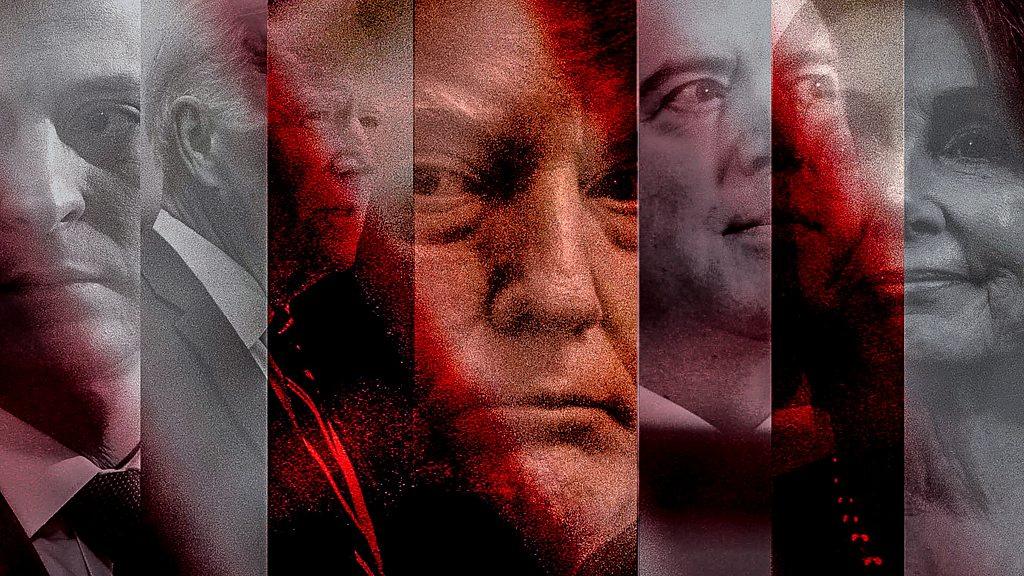Trump impeachment inquiry: Did Republican witnesses help Democrats more?
- Published
Why did this impeachment witness earn applause?
On day three of public hearings in the impeachment inquiry, the witnesses included top aides who listened in on President Trump's call with Ukraine's leader. What did we learn?
One was a decorated Iraq War veteran who was born in Ukraine and came to the US as a child, Lt Col Alexander Vindman.
The other was US Vice-President Mike Pence's top adviser on Russia, Jennifer Williams.
With the TV cameras rolling on Capitol Hill, they repeated concerns they had aired behind closed doors about the July phone call between the two leaders.
But much of Tuesday's hearing was spent talking about a person who was probably not even in the room - the whistleblower.
Here are my takeaways.
'I do not know who the whistleblower is'
Did Alexander Vindman talk to the whistleblower about Trump's 25 July phone call with Ukraine's president?
That certainly seems to be what Republican Devin Nunes believes.
After a few questions about Hunter Biden and Ukraine, Nunes started asking the two witnesses about whether they spoke to the press about the now famous Trump phone call.
He started with Jennifer Williams, who said she did not, but that was just a feint. The real fireworks came when Vindman spoke of the two people he talked to. The first was George Kent, the senior State Department Ukraine expert who had himself testified before the committee last week.
The other was... an intelligence community official.
For those who haven't been following closely, it has been widely reported that the whistleblower - the individual whose complaint set off the chain reaction that has led to these impeachment hearings - was a member of the intelligence community.
When Democrat Adam Schiff cut in, saying "these proceedings will not be used to out the whistleblower", the audience let out an audible "oooh".
But Vindman has testified that he doesn't know who the whistleblower is, Nunes responded, so how could he out that person?
A beginner's guide to impeachment and Trump
Things got tense.
When Nunes referred to Vindman as "Mr", the Army officer curtly corrected him that it he should be addressed as "Lieutenant Colonel Vindman".
Despite being pressed, Vindman and his lawyer dug in. He would not name names. Democrats have asserted that the impeachment investigation has become much bigger than the whistleblower, whose original complaint has been largely corroborated and whose identity is protected under federal law.
Republicans - from the president on down - return time and time again to the whistleblower's identity, however, and what motivations he may have had to file his complaint.
They may believe that if they undercut that person's credibility, the rest of the allegations will be treated with greater scepticism.
Body language
In his Wednesday morning testimony, Vindman spoke of a 10 July White House meeting with Ukrainian officials where Gordon Sondland, the US ambassador to the EU, twice brought up announcing investigations in exchange for a White House visit by Ukrainian President Volodymyr Zelensky.
The first time, he says, National Security Advisor John Bolton abruptly cut the meeting short. Vindman testified that after a brief photo session, Sondland once again spoke of investigations of the Bidens, Ukrainian energy company Burisma and alleged Ukrainian meddling in the 2016 US presidential election.
Other Democratic questioning attempted to place Donald Trump's 25 July phone call with Zelensky, to which Vindman also was a first-hand witness, within the context of Sondland's Ukrainian efforts.
Vindman testified that it seemed like Zelensky was "prepped" for Trump's ask for a Biden investigation. They suggested that the 10 July Sondland activity was exactly that kind of prepping.
If what Vindman said was important, how he said it in the public hearings also mattered.
Behind closed doors, veteran ambassadors Bill Taylor and Marie Yovanovitch were reportedly smooth while Vindman was halting and nervous. Those observations have been confirmed by their public testimony.
When Vindman delivered his opening statement, a few yards from where I was seated, his hands trembled slightly. He occasionally stumbled over his words.
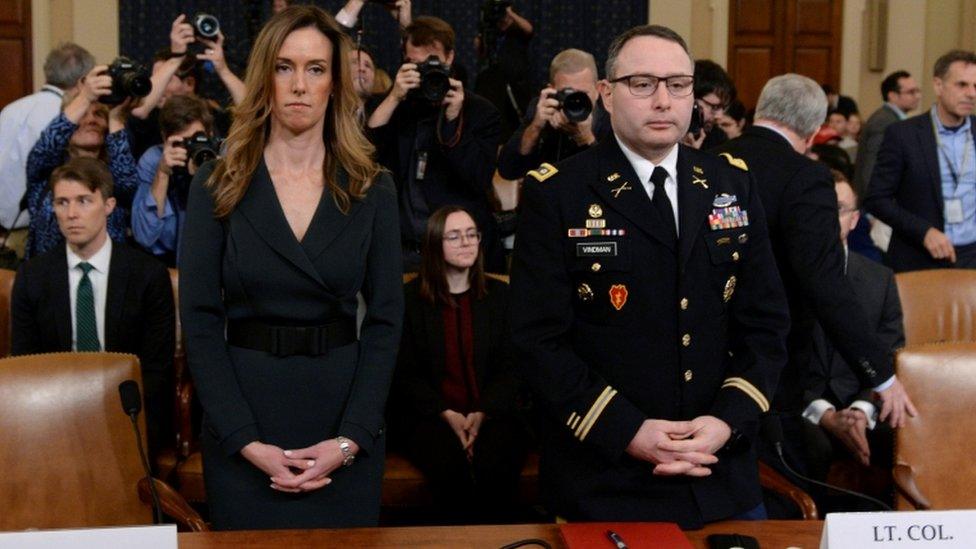
Republicans could paint that as weakness or uncertainty, but it might also be seen by Americans as giving his testimony a touch of humanity - particularly when paired with the emotional closing words to Vindman's opening statement.
Vindman offered reassurance to his father, who brought his children to the US from the Soviet Union 40 years ago, that he was sitting in the US Capitol and would be "fine for telling the truth".
Toward the end of Vindman's appearance, he was asked by a Democratic congressman to read that line again - and then added why he's not afraid of testifying today.
"Because this is America," he said. "This is the country I have served and defended... and here, right matters."
A smattering of applause broke out from supporters in the hearing-room audience. But Vindman's testimony will only add to the contentious debate among Democrats and Republicans over who is right and exactly what the truth is.
Did Republican witnesses help Democrats more?
Later on Tuesday, the lawmakers heard from former National Security Council official Tim Morrison and US ex-special to Ukraine Kurt Volker. They had been listed as two men Republicans wanted to talk to during the public impeachment hearings.
It turns out they hurt Donald Trump's defence as much as they helped it.
Morrison did say there was nothing illegal or concerning about Donald Trump's 25 July phone call with Ukrainian President Volodymyr Zelensky and no ill motive for moving the rough transcript of that call to a more secure government server.
He also, however, corroborated reports that US Ambassador to the EU Gordon Sondland pressured Ukraine to open investigations that could prove politically helpful to Donald Trump - and that Sondland was in regular contact with the president.
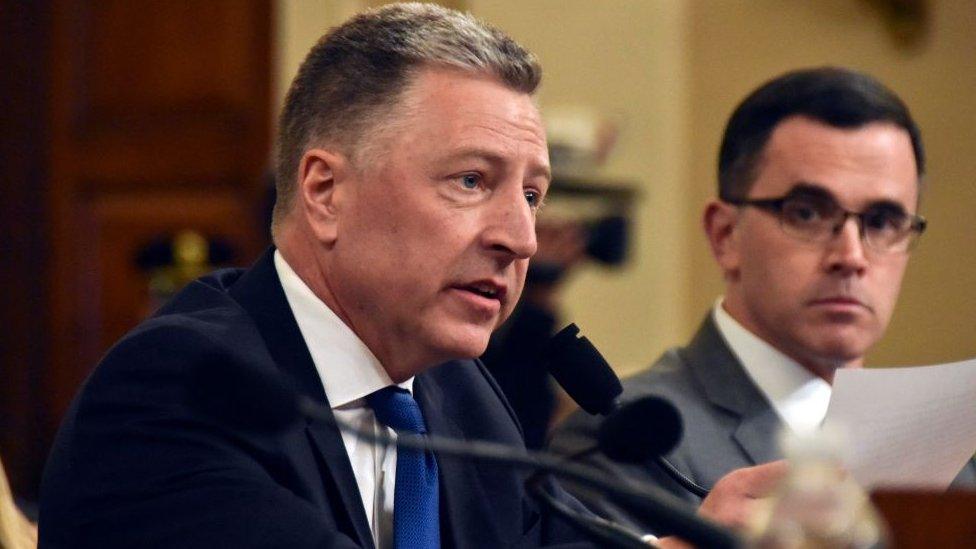
Volker said he recalled past instances where the US had held up aid to a foreign nation and saw no evidence of bribery in this case, but he also turned out to be a character witness for Joe Biden.
Not only did he assert that there was nothing untoward about the former vice-president's dealings with Ukraine, but he expressed dismay to learn that when Trump administration officials were calling for investigations into Ukrainian energy company Burisma, they were really looking to damage the Democratic presidential hopeful.
That, and his acknowledgement that military aid may have been held up to increase the pressure on Ukraine, represented a change from Volker's closed-door testimony - given as one of the investigation's first witnesses.
Democrats may suspect that Volker's new assertion is convenient naiveté or intentional obliviousness to avoid culpability, but it means his testimony still was of relatively little use for Republicans.
Now the stage is set for Wednesday's appearance by Sondland - a man whose name came up throughout the day on Tuesday. The ambassador has already had to revise earlier sworn testimony to reflect memories he said were refreshed by other witnesses. He'll be further pressed by both Democrats and Republicans in what could be the most unpredictable appearance of any of the witnesses so far.
Republican Congressman Mark Meadows of North Carolina, one of the president's most ardent defenders, calls Sondland a "wild card". Tomorrow we may have a better idea which side has a winning hand.

Learn more about Trump and impeachment inquiry

SIMPLE GUIDE: A basic take on what's going on
GO DEEPER: Here's a 100, 300 and 800-word summary of the story
WHAT'S IMPEACHMENT? A political process to remove a president
VIEW FROM TRUMP COUNTRY: Hear from residents of a Pennsylvania town
ON THE DOORSTEP: A Democrat sells impeachment to voters
FACT-CHECK: Is the whistleblower linked to Democrats?
CONTEXT: Why Ukraine is important to the US
Opposing narratives
For Americans watching the impeachment hearings, it often seemed as though the Democrats and Republicans weren't just talking across each other, they're not even existing in the same political universe.
That divergence of realities was on stark display from the start of Tuesday's proceedings, as Democrat Adam Schiff and Republican Devin Nunes gave their opening remarks.
As he had in the previous two days of hearings, Schiff used his time to lay out what he views as the case against Donald Trump. He described the president's alleged "scheme" to pressure the Ukrainian government to open investigations of Democrats that could be politically beneficial to him.
He noted witness testimony of instances of this Ukrainian pressure.
He cited Saturday's closed door deposition by US Ukraine-based diplomat David Holmes, who said he overheard a call during which Trump asked US Ambassador to EU Gordon Sondland about the "investigations". Sondland, Holmes said, would later observe that the president didn't care about Ukraine beyond how the investigations could help him personally.
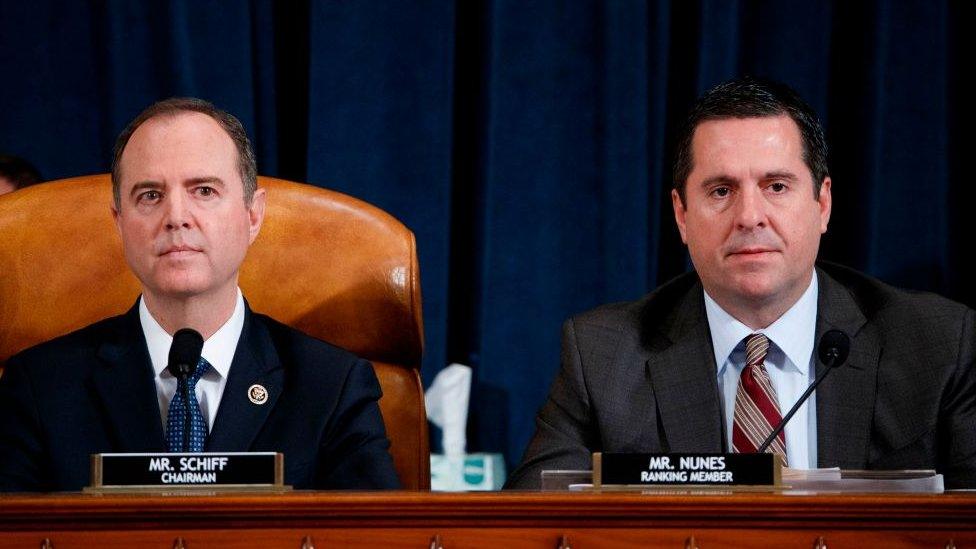
Both Nunes and Schiff represent the state of California
Nunes, in his five-minute statement, declined to offer a line-by-line defence of the president. Instead, he went on the attack.
He said media coverage of last week's impeachment hearings were biased in favour of the Democrats. He called out CNN, the Guardian, Slate, the Daily Beast, New York magazine and others by name. He said their coverage of Robert Mueller's special counsel investigation into Russian meddling in the 2016 presidential election was frequently wrong, and the Ukraine story was simply a continuation of a campaign to oust the president.
Democrats, in these hearings, are trying to set out a series of facts that they say point to presidential abuse of power and could constitute an impeachable offence. The Republican strategy, at least at this point, is to encourage Americans that they can't trust the facts - or the mainstream media outlets that are reporting them.
- Published14 November 2019
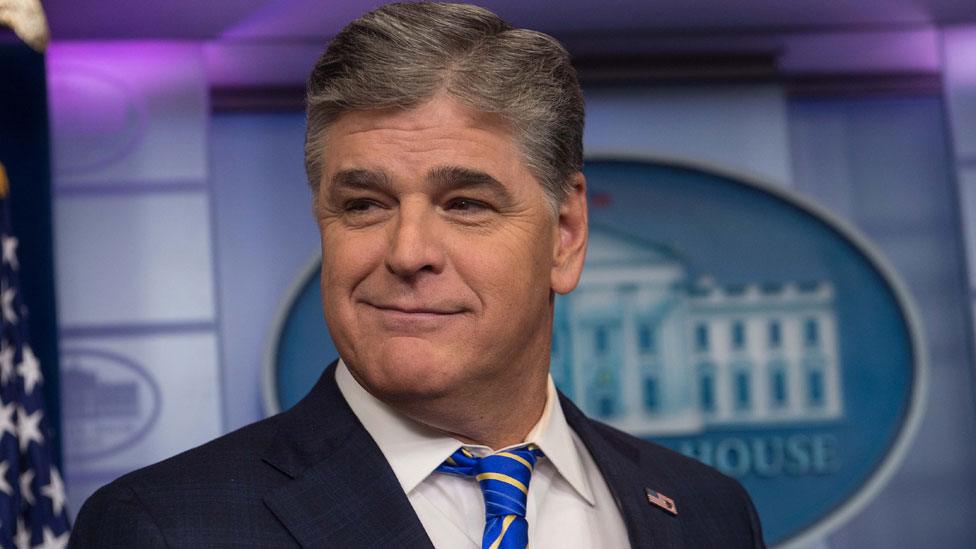
- Published15 November 2019
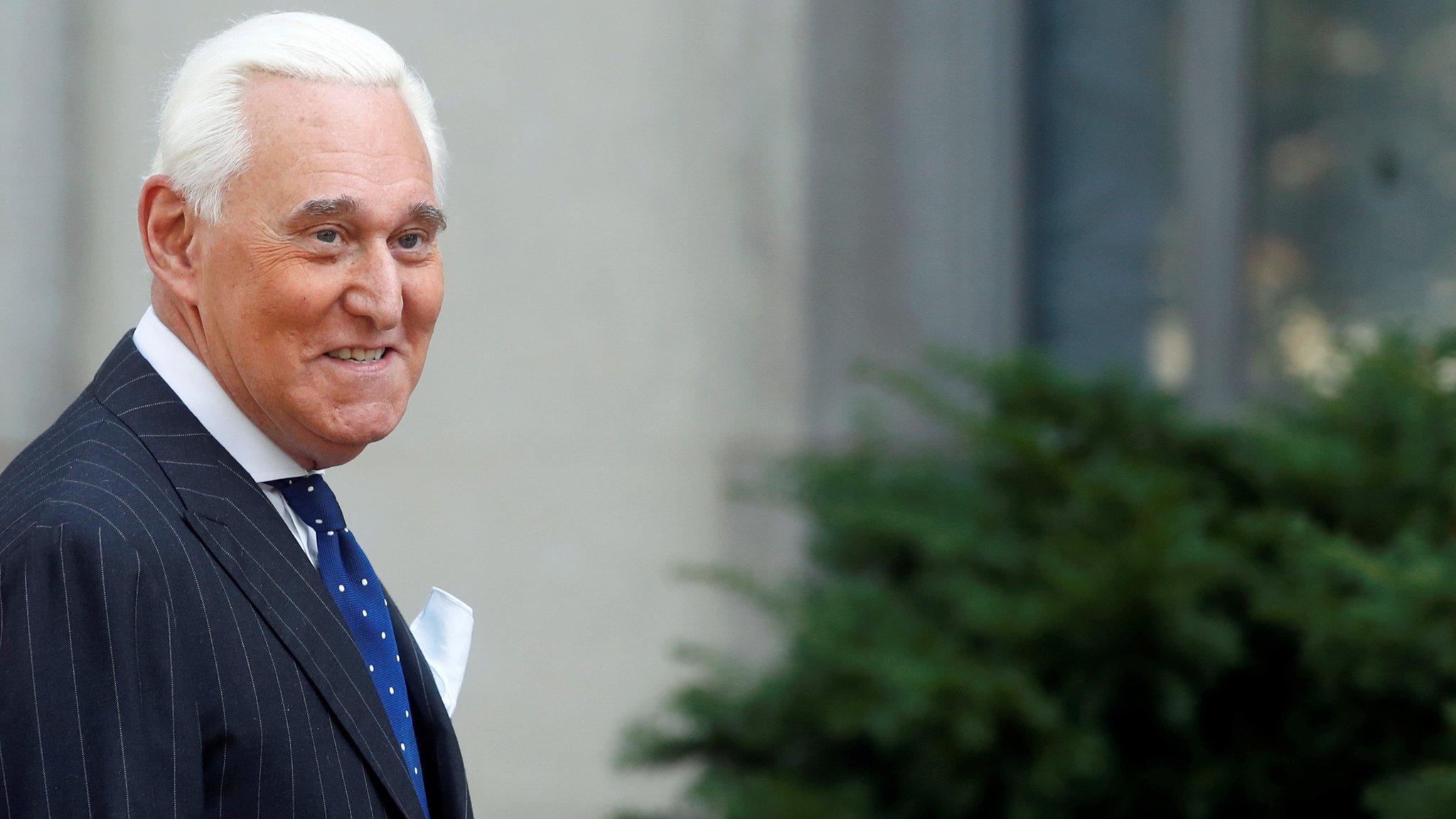
- Published14 November 2019
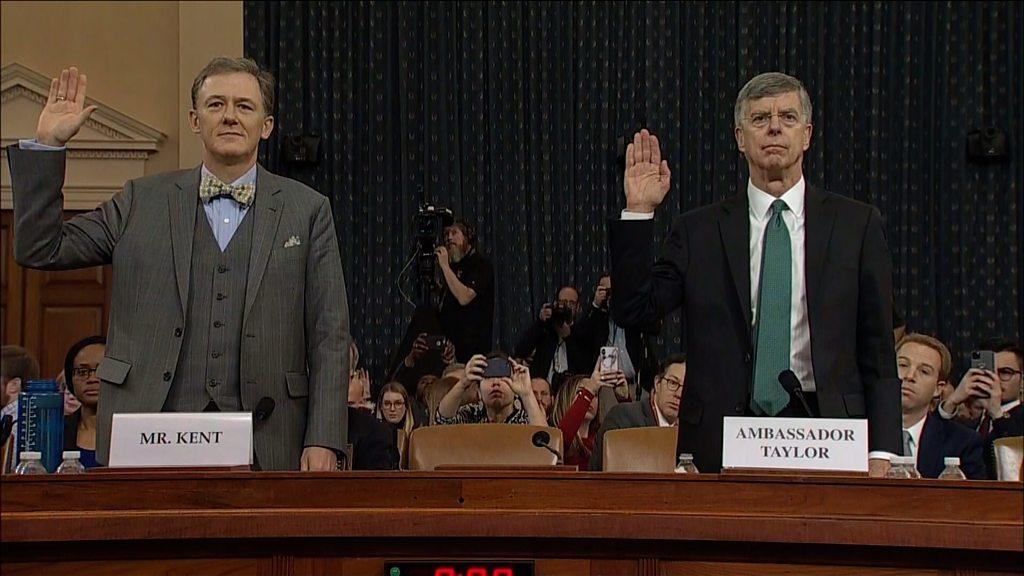
- Published13 November 2019
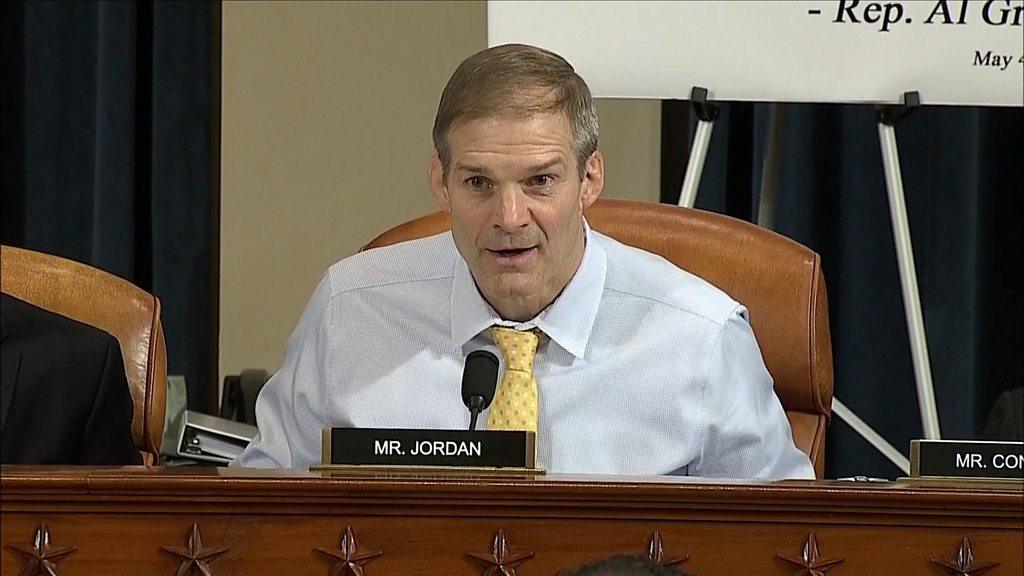
- Published14 November 2019
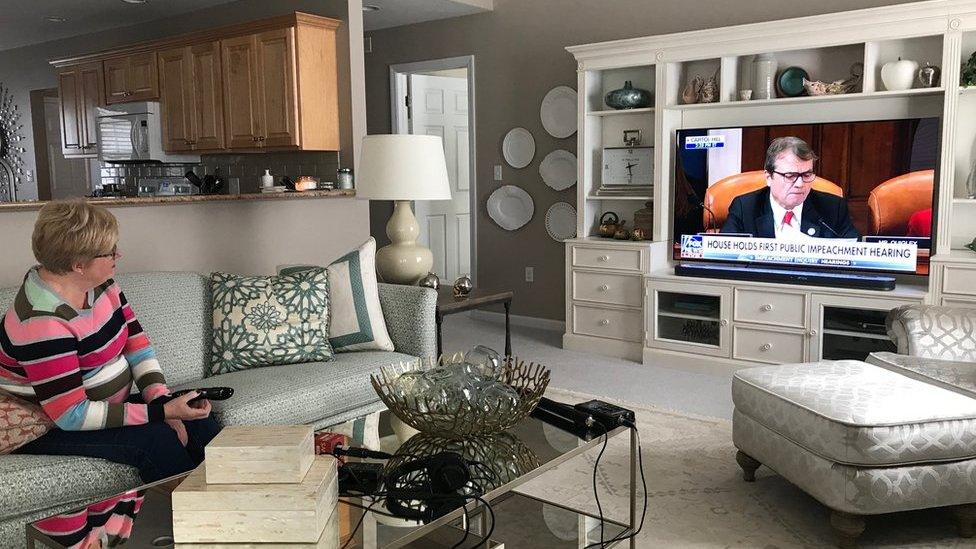
- Published14 November 2019
